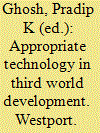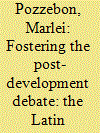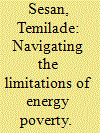| Srl | Item |
| 1 |
ID:
045515


|
|
|
|
|
| Publication |
Westport, Greenwood Press, 1984.
|
| Description |
xxiv, 494p.
|
| Series |
International development resource books
|
| Standard Number |
0313241503
|
|
|
|
|
|
|
|
|
|
|
|
Copies: C:1/I:0,R:0,Q:0
Circulation
| Accession# | Call# | Current Location | Status | Policy | Location |
| 025410 | 338.9/GHO 025410 | Main | On Shelf | General | |
|
|
|
|
| 2 |
ID:
163066


|
|
|
|
|
| Summary/Abstract |
This essay revisits the historical development of a concept – tecnologia social – as one avenue for discussing alternatives to post-development, arguing that the Western-based historical path of technology development is one of the main sources of growing human impoverishment, social inequalities and economic dependency. The concept of tecnologia social points towards political processes that create opportunities to redefine the arrangements among social groups, artefacts and methods used in everyday life, particularly for production and consumption. Because the post-development debate has been criticised for formulating a sound and strong critique to mainstream development but failing to propose concrete empirical alternatives, we seek to foster the debate through the Latin American concept of tecnologia social.
|
|
|
|
|
|
|
|
|
|
|
|
|
|
|
|
| 3 |
ID:
114305


|
|
|
|
|
| Publication |
2012.
|
| Summary/Abstract |
Energy poverty has been defined as the lack of access of households in developing countries to modern energy sources, and their consequent reliance on solid biomass fuels for cooking. Improved stoves have been promoted by development actors since the 1970s to alleviate various environmental and health problems associated with biomass use, with largely disappointing outcomes. Against this background, this paper examines the intervention of an international development organisation - Practical Action - in West Kochieng, Kenya, where the organisation's energy poverty alleviation efforts are aimed at addressing the health hazards of biomass smoke with six 'low-cost' improved cooking technologies. The study reveals that the cooking technology most valued by poor West Kochieng households is the one which most reflects their priorities, rather than those expressed by Practical Action. The findings point to three aspects of appropriateness of energy poverty alleviation interventions - technological, economic and cultural - which combine to influence acceptance and uptake of such interventions. The evidence highlights some of the limitations inherent in the generic policy recommendation to 'leapfrog' towards the resolution of energy poverty-related problems, and suggests that more measured steps which respond to the socio-economic realities of poor households are likely to engender more appropriate solutions.
|
|
|
|
|
|
|
|
|
|
|
|
|
|
|
|